This mare is “staking a claim” on this hill. She doesn’t want her friend standing there. What differentiates this activity from others, such as just moving a another horse from behind, is its sudden and very territorial nature.
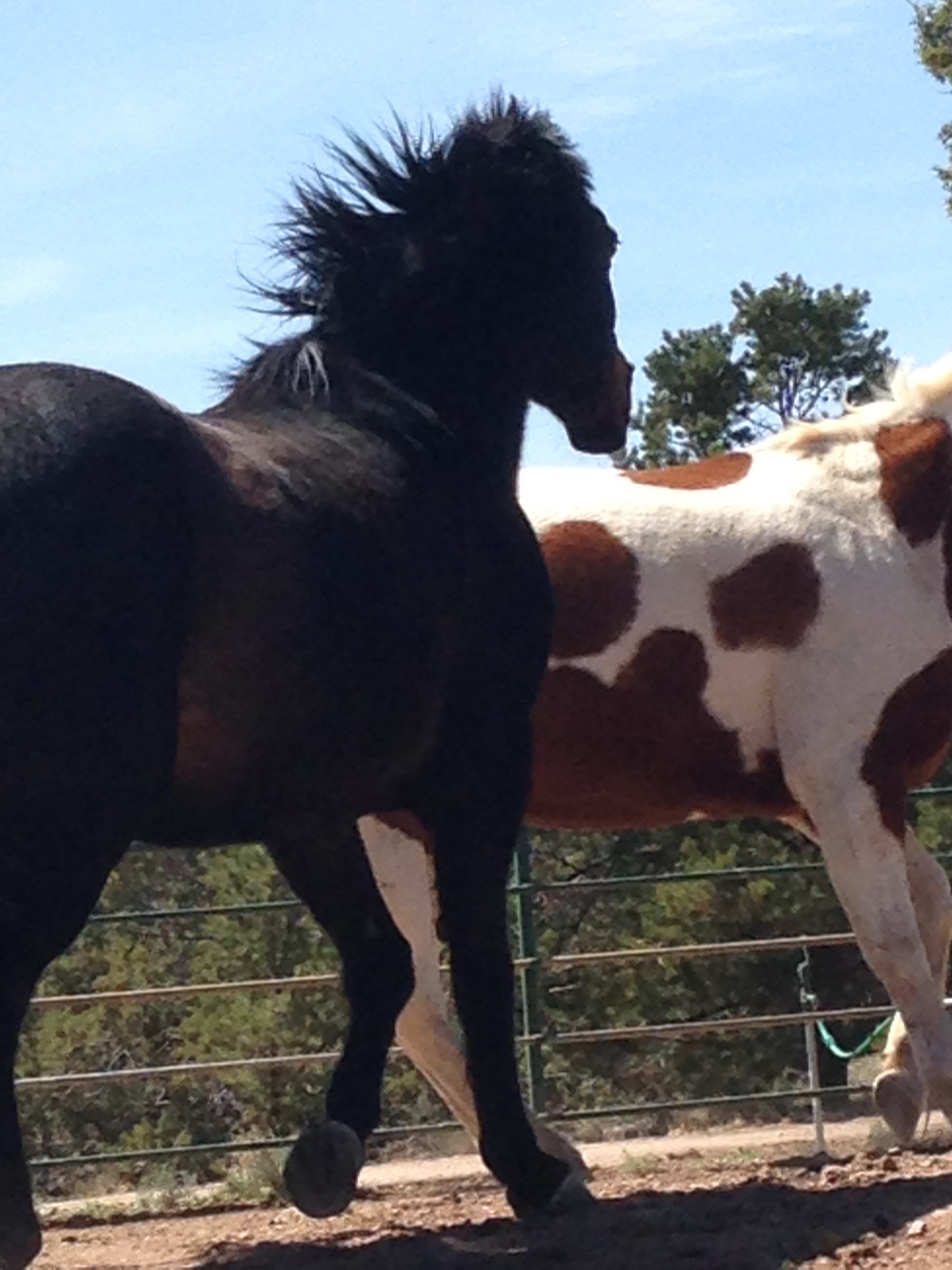 Moving the horse reminds him that he can be moved. It is not the same as walking him down and more often doesn’t involve food. Horses can be moved with flattened ears, sudden movement, and facial and body gestures.
Moving the horse reminds him that he can be moved. It is not the same as walking him down and more often doesn’t involve food. Horses can be moved with flattened ears, sudden movement, and facial and body gestures.
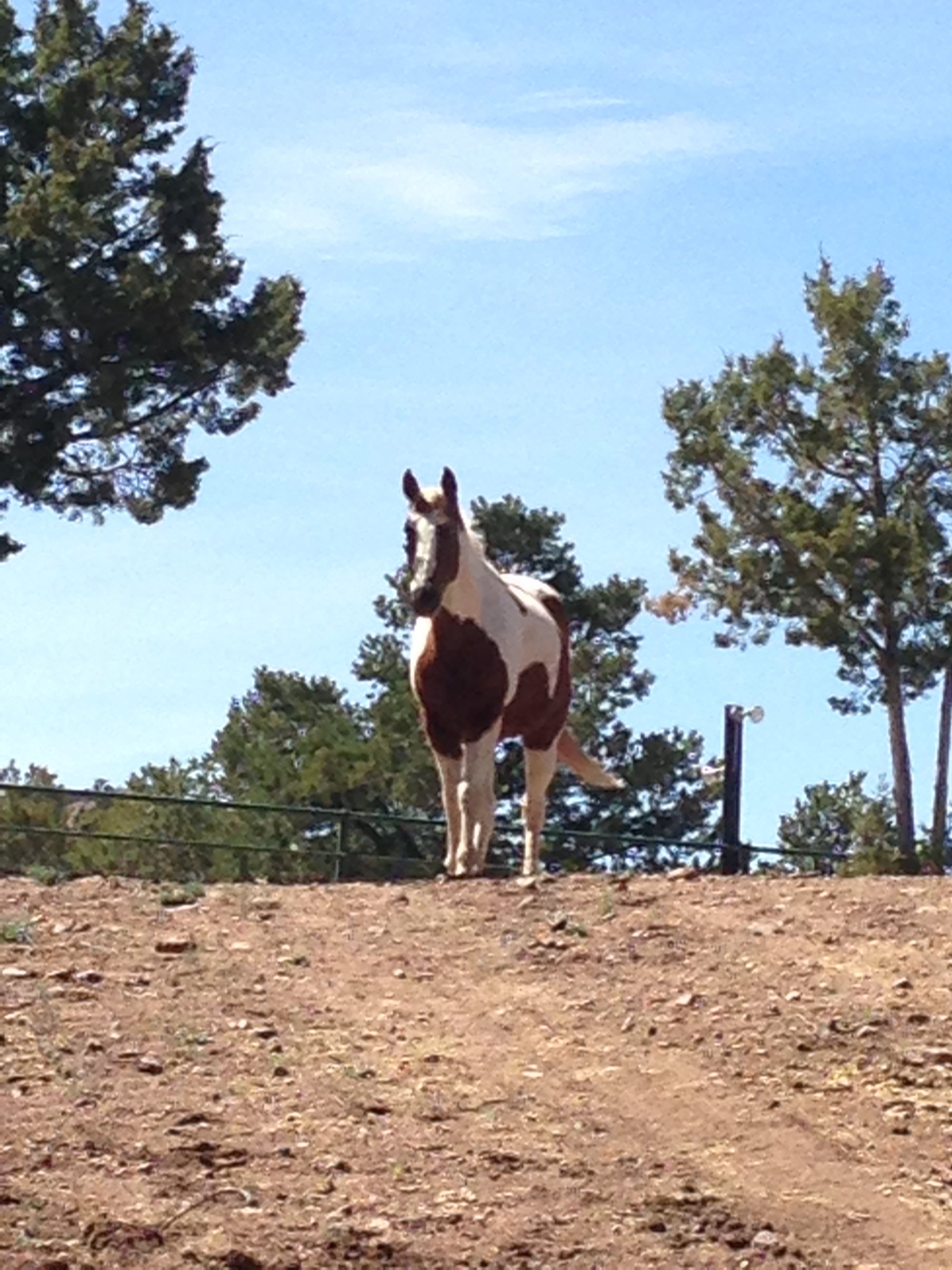
The horse who is low on the totem pole, uncertain of his position in the herd, suffering from loss of a loved one, who doesn’t think well, will be helped and sustained by being moved around a lot.
Notice how Patches leaves in a blur, he wasn’t expecting her to come after him like that. All he was doing was standing on a hill. I don’t always understand why horses decide another horse needs to leave a particular area, but if they’re sensible I figure they have some knowledge that I don’t have.
I was taking a photo of him. Zuzka was standing next to me and suddenly she lunged forward, up the hill.
What we can learn from this is that this is where we want to get to in our Liberty Foundation work – staking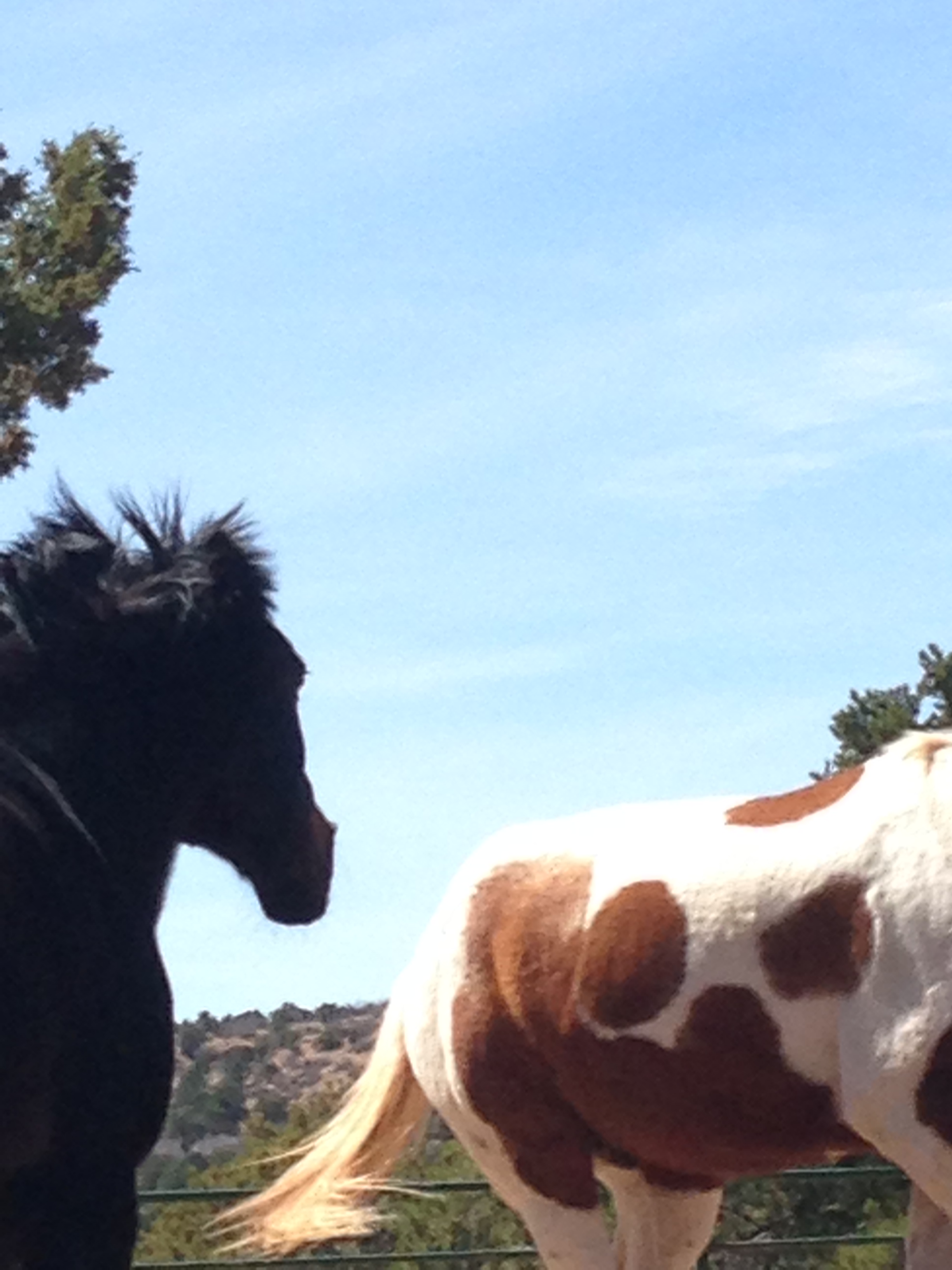 a claim. It’s not something I do with every horse, but with those who need to get clear on leadership, it’s vital. It has a different feel from walking down but it is part of the “now you can eat, now you can’t,” work we have been establishing with various approaches and the use of food or space.
a claim. It’s not something I do with every horse, but with those who need to get clear on leadership, it’s vital. It has a different feel from walking down but it is part of the “now you can eat, now you can’t,” work we have been establishing with various approaches and the use of food or space.
I use it with horses who exhibit rude or aggressive behavior — biting, shouldering in, in general, not honoring a person’s space. I don’t do it until I have established a relationship with the horse, unless it’s very clear this must be done sooner in the learning process. Sometimes the first foundations can establish order before getting to this one. It is not to be done repeatedly; once is generally enough.
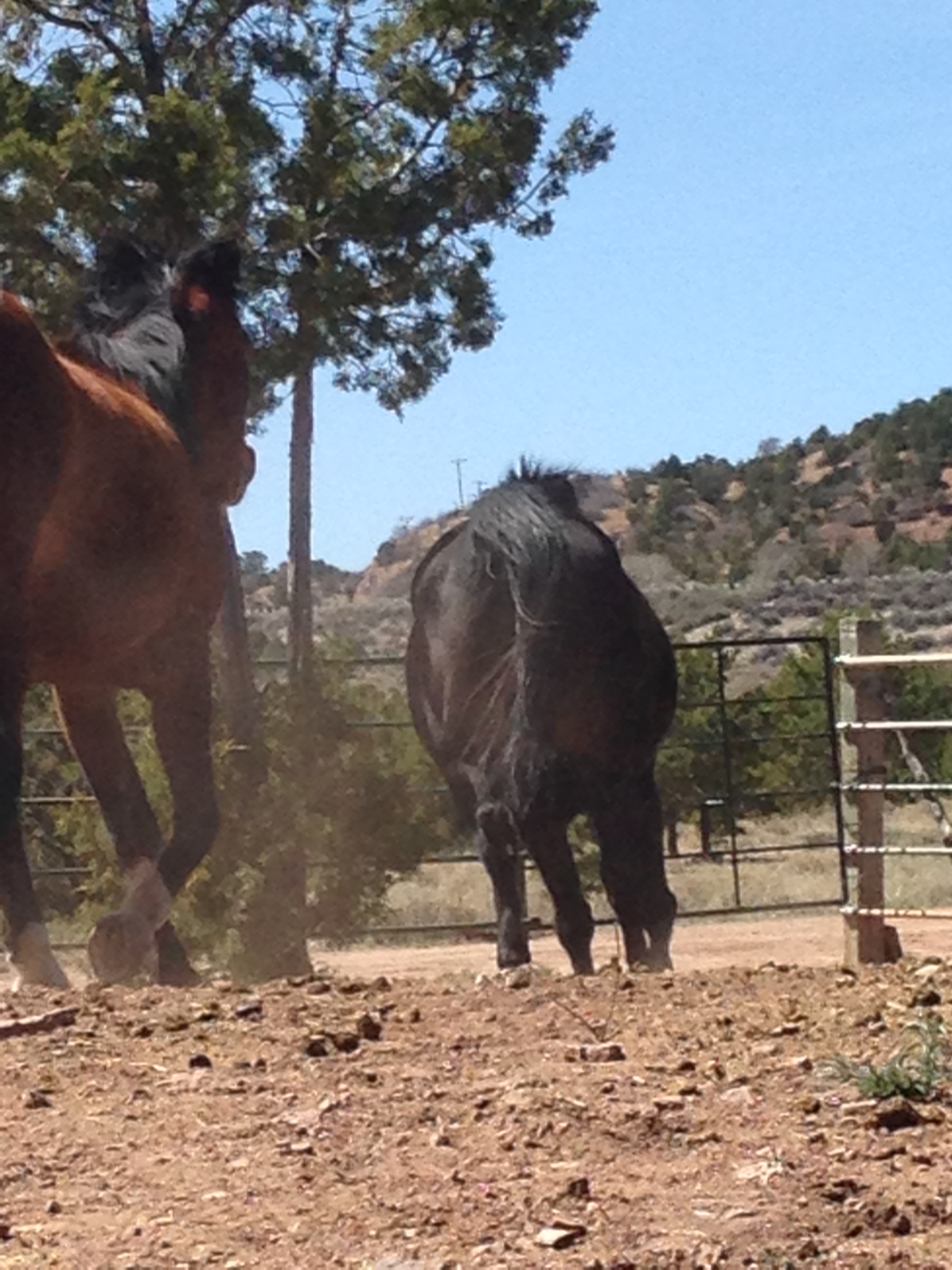
Because some horses are more receptive to the importance of space than food, this is an important one to know. We also want to be able to move a horse off when we are not getting a connection or when we need them to give us space or even a particular space. People allow horses to crowd them without even knowing it.
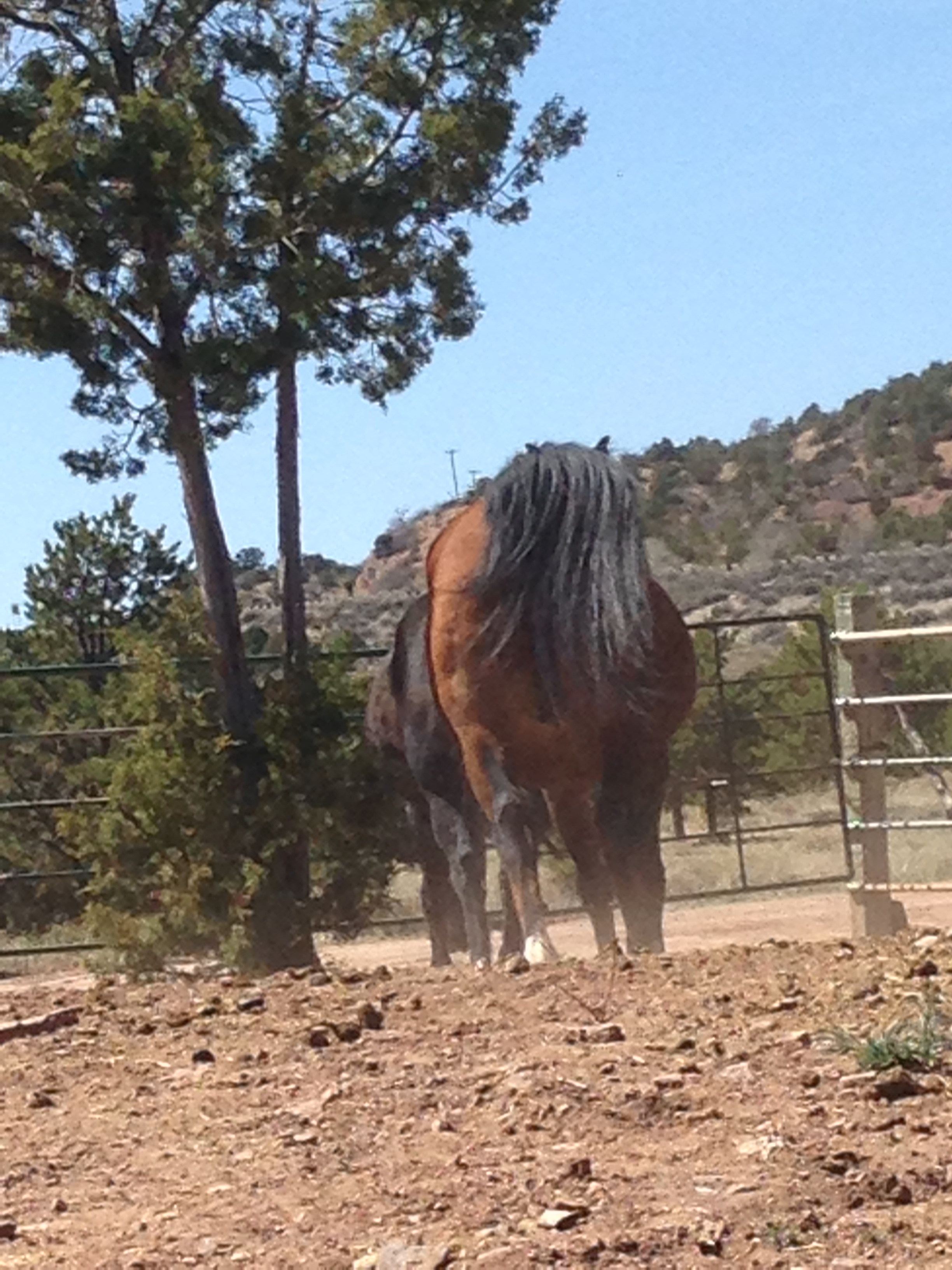 Amazingly, this foundation leads to greater connectedness between you and your horse. It is the beginning of our next foundation, “Go and Come to Me.” In a regular small arena, the horse has room to get away if he doesn’t want to participate. That’s where you can see where your true relationship lies.
Amazingly, this foundation leads to greater connectedness between you and your horse. It is the beginning of our next foundation, “Go and Come to Me.” In a regular small arena, the horse has room to get away if he doesn’t want to participate. That’s where you can see where your true relationship lies.
Relationship lies in the opportunity to make a choice. You can send a horse in a round pen and they will come back, because there isn’t really anywhere else to go. It’s a short cut to relationship and leaves out five very fundamental pieces to relationship building. People’s individual energy also gets exposed outside the round pen. In the round pen, almost anyone can get a horse to come to them.
Outside it, the horse can be more particular. I have one mare who won’t give you the time of day if you don’t get your energy right for her. She basically says, you don’t know how to speak horse. Another of my horses will do what he feels the person needs to know. He is a teaching horse of another kind. He teaches people to feel the glue between them when they walk together. He teaches connection, so people can feel it and want it.
My mare who won’t give you the time of day, will make you work for it. I’ll do exercises with you to help you come into connection before you even approach her.
Sending a horse off is hard for some people. They’re afraid that the horse won’t want to come back. A very timid horse may not come back, so it’s not ideal for those horses. The timid horse may become bold later on in its training and then we can do this exercise.
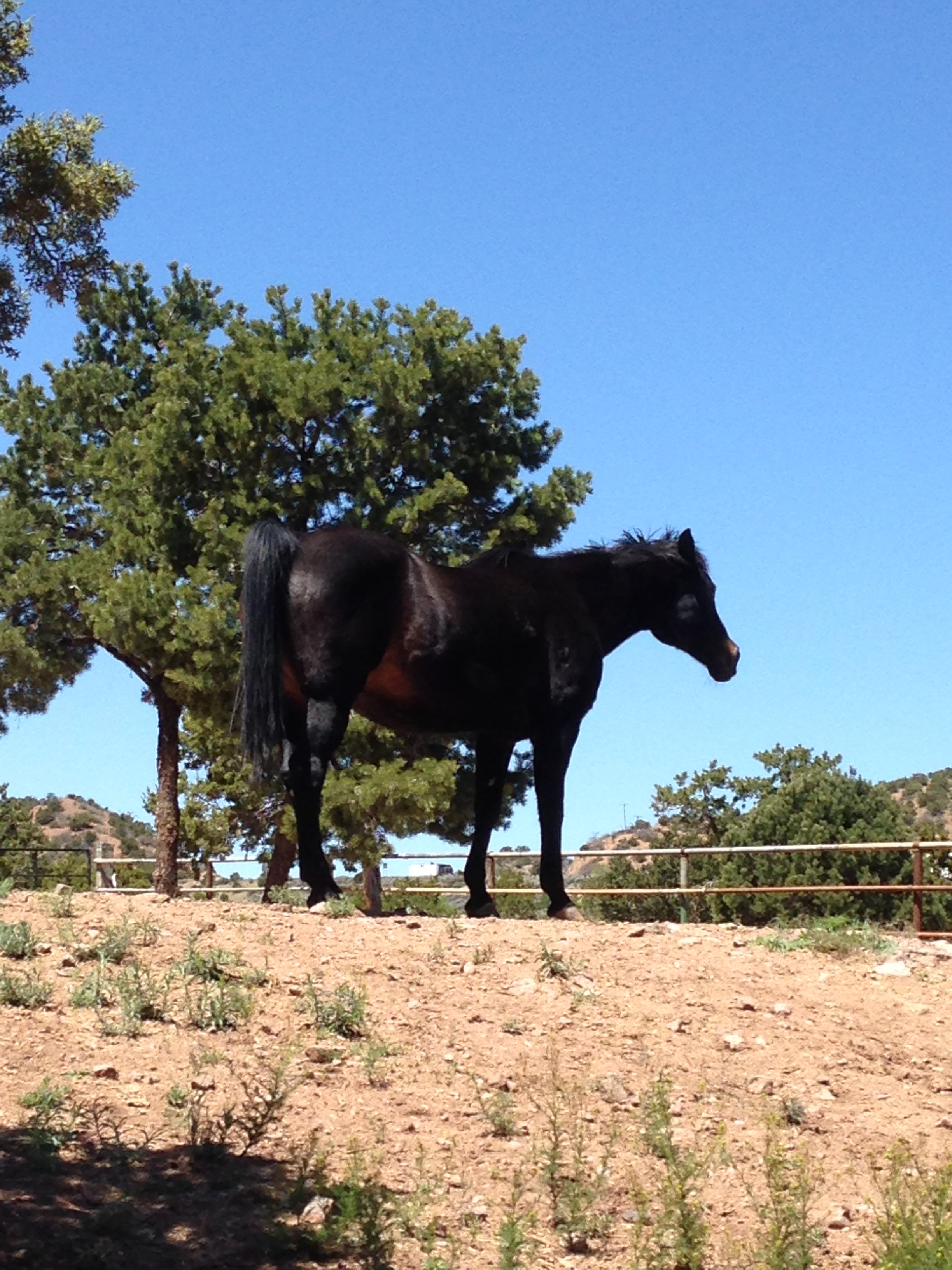
I can feel the person who is afraid of sending their horse, sending their energy off with the horse, yearning for it, unable to untether themselves energetically.
When you get used to sending your horse, you’ll notice the horse finds you more interesting. You’re doing what other horses would do. If a horse is always in charge of a herd or tends to be bossy, she may be surprised at being sent off, because she is rarely sent off of any place or any food. But your being able to move this horse can be the best thing for her.
How people may “Stake a Claim:”
[youtube https://www.youtube.com/watch?v=8ofw5iZQ3-M&w=420&h=315]
Copyright (c) Susan Smith
****
Take advantage of a special offer: $20 off a Horse + Rider session ($95 value) from now through September 1! You can purchase it now and use at any time.
Services include:
Bodywork: (Ortho-Bionomy for people, Equine Ortho-Bionomy, Equine Positional Release (EPR)): private sessions, tutorials, phone consultations, Horse & Rider sessions
Distance Healing Communication
Gift certificates
Ask about The Equine Body instruction & curriculum
Liberty Coaching:
Clinics, mini-clinics, workshops,
Private and semi-private sessions, tutorials
Consultations: by appointment: 505.501.2478 or emailing susansmith@orthohorse.info Contact me for details.
Let me know if you want to do a clinic in your area. Prices will vary according to location & travel costs.
Saturday, July 11 – Hang with the Herd – Join me and my herd under the cool canopy of the trees for some real quality time together –Experience herd, honesty, healing. A new Liberty Foundations ½ day workshop for those who want an introduction to the work or to reinvigorate their liberty process. PayPal and credit card payment available.
We will sit in the cool of the trees with the herd during the morning, go work with the horses, then come back to the trees with cold drinks when it gets hot. Excellent herd to liberty experience! Space will be limited, be sure to enroll soon to ensure your spot. Location: Mac’s Overnight Stables, Canoncito (near El Dorado), Santa Fe, NM. Time: 9 a.m.-12:30 p.m. $75. Contact susansmith@orthohorse.info or 505-501-2478 for information.
September 26-27 – Fall Liberty Weekend in Oklahoma — Susan Smith and Ruella Yates, co-instructors. Contact either of us: susansmith@orthohorse.info or ruella@libertyfoundations for further details. Cost: $325. Clinic is filling quickly, be sure to enroll!
December 7-11 Sahaja 2015 5-Day Clinic on the island of St. Vincent in the Caribbean – Susan Smith & Stina Herberg. See details:
Independent Liberty Trainers Network
Susan & Stina Team Up to Make the Sahaja Clinic an Unforgettable Experience
Susan is a member of the Independent Liberty Trainers Network. libertytrainersnetwork.com/
Associate Instructor, Advanced Practitioner – Ortho-Bionomy & Equine Ortho-Bionomy
Practitioner, Equine Positional Release
Liberty Foundations Coach



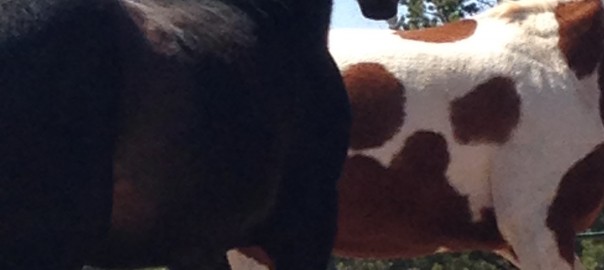
Beautiful video, Susan, and perfectly illustrative of what you are talking about in this blog. To me it shows that you respect this horse as much as you want her to respect you, so there is a give-and-take going on… which is what happens naturally in every horse herd between its members. All. The. Time. Lovely!
Loved reading about what goes on in your herd, Susan, with some fascinating interactions that made me smile…or made me wonder what caused this! 🙂 It’s the Old West activity of Staking a Claim, perfected by the Horse Nation!
For the Free Horse,
Ruella Yates
Liberty Foundations
Spirit Horse Ranch